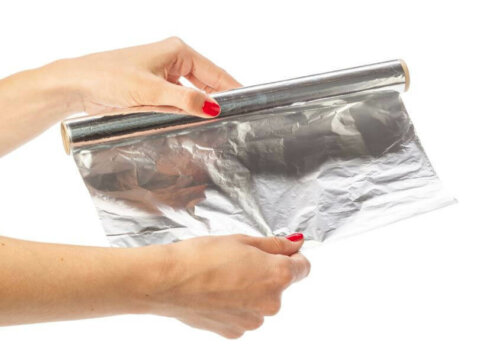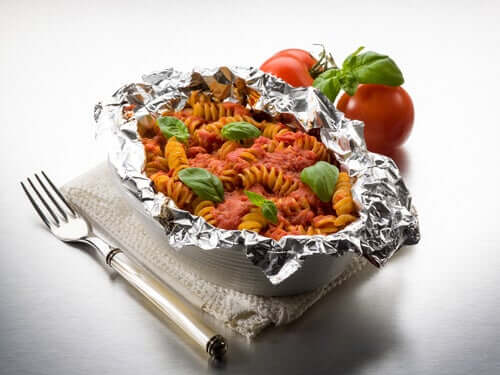Should You Use Aluminum Foil for Cooking?


Reviewed and approved by the pedagogue in physical education and nutritionist Elisa Morales Lupayante
The use of aluminum foil for cooking wasn’t questioned until very recently, but we should continue to ask questions. There’s definitely been talk about which side of it should be in contact with food: the matte side or the shiny side. That’s a start.
In general, aluminum foil serves three purposes:
- To cover surfaces on which food is to be cooked (baked, for example)
- Food preservation (wrapping)
- To keep it warm after cooking is finished
This material is definitely useful, easy-to-handle, and extremely affordable. However, is it really safe? How often should you use it? Continue reading to learn more about it.
Why shouldn’t you use aluminum foil for cooking?

You might like Seven Mistakes We All Make in the Kitchen
What’s aluminum?
The use of aluminum has been quite popular since the 20th century, just a little bit less than steel. Furthermore, it’s mined from bauxite, a type of sedimentary rock. It has a long service life and is also a good conductor of electricity and heat. Other outstanding properties are:
- Tenacity. This refers to the ability of a metal to absorb energy before breaking or losing its shape.
- Malleability. This is a physical property by which one can create sheets from a given metal.
- Ductility. This means the metals are flexible and one can shape them by force without breaking them in order to obtain wire and such.
When is aluminum harmful to health?
Aluminum (alloyed with other elements) is an inexpensive material and you can find it in the form of cutlery, pots, pans, and many other common utensils. However, we must say there isn’t any evidence to suggest that the use of these utensils is harmful to your health.
However, wrapping food in aluminum foil and heating it at high temperatures can be harmful. Mainly with acidic or spicy food. Let’s go over some details to understand this point.

How does aluminum work in the human body?
The human body can excrete aluminum but only in small amounts. In other words, minimal intake won’t cause a problem. As an indicator, you can have a value of 1574.8 mils per every 2.2 pounds of weight per day.
Note that we’re all a lot more exposed to this metal than we think on a daily basis. You can find it in various types of food and places such as:
- Tea
- Corn
- Herbs
- Cooking salt
- Drinking water
- Yellow cheese
- Aromatic spices
- Some drugs such as antacids
Among the most common disorders caused by high traces of aluminum in the body, we can mention the following:
- Some people think it increases the probability of Alzheimer’s disease
- Aluminum is extremely harmful to patients with kidney problems
- It can worsen the health of patients with bone problems
- Finally, it reduces the growth rate of human brain cells
Check out Seven Mistakes We All Make in the Kitchen
Avoid using aluminum foil to cook at high temperatures
An important factor in reducing the amount of aluminum in your body is to not scrub any utensils made of this metal after using them. This is because it leads to rust and forms an inert layer that keeps aluminum from mixing with the food it touches.
The main problem lies in wrapping food in aluminum foil for cooking purposes as this is disposable and won’t create that inert layer before you use it. Thus, when you cook, the aluminum may get into the food and exceed the limits considered safe in the body.
In conclusion, you can continue to use aluminum foil in the kitchen for storing and handling food. Just be careful using it for cooking at high temperatures.
https://mejorconsalud.com/por-que-nunca-deberias-usar-papel-de-aluminio-para-cocinar/
All cited sources were thoroughly reviewed by our team to ensure their quality, reliability, currency, and validity. The bibliography of this article was considered reliable and of academic or scientific accuracy.
- Crisponi, Guido & Fanni, Daniela & Gerosa, Clara & Nemolato, Sonia & Nurchi, Valeria & Crespo-Alonso, Miriam & Lachowicz, Joanna & Faa, Gavino. (2013). The meaning of aluminium exposure on human health and aluminium-related diseases. Biomolecular concepts. 4. 77-87. 10.1515/bmc-2012-0045.
This text is provided for informational purposes only and does not replace consultation with a professional. If in doubt, consult your specialist.








